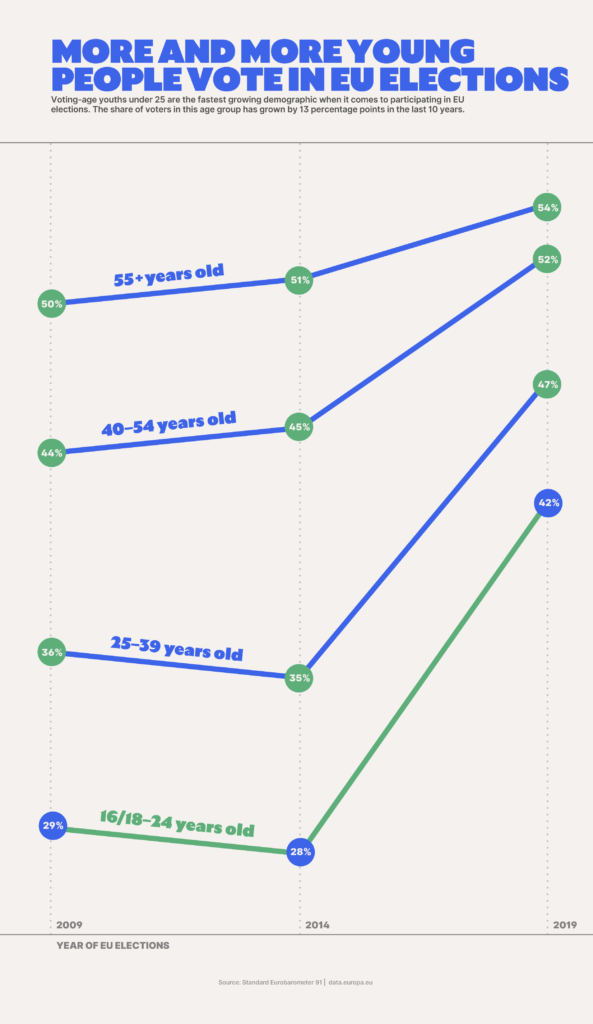With democracy in constant flux, young Europeans face unique challenges in politics and are adapting with new forms of participation to shape the future of society.
Contemporary democracy, constantly evolving and facing unprecedented challenges, is witnessing an increasingly complex political participation of citizens. This scenario is particularly relevant in the context of youth political participation in Europe, which is at a critical juncture, shaping future trends and developments in society.
The involvement of young people in governance and political decision-making processes is strongly influenced by the political, socio-economic, and cultural context. There is strong evidence that youth participation in formal political processes is relatively low compared to that of older citizens, calling into question the representativeness of the political system.
In addition, the presence of young people under the age of 35 in formal political leadership positions is low. In many countries, the minimum age for entering parliament is 25 or older.
However, young people are becoming involved in democracy and their participation takes different forms, such as voting, joining parties, working in local youth councils, participating through youth organisations or online political activism, or through protest movements.
This participation occurs in a scenario of democratic transformation and political, social and economic uncertainties. Additional challenges have emerged recently, such as the Covid-19 pandemic, increased political and social polarization, economic crises and wars.
In order to gain a better understanding of young people’s participation in democratic decision-making, the European Commission conducted a survey through Eurobarometer (“Eurobarometer is the official research tool used by the European Parliament, the European Commission and other European Union institutions and bodies to monitor regularly the state of European public opinion on issues relating to the European Union, as well as attitudes towards issues of a political or social nature”), comparing data on young people’s participation in the 2009, 2014 and 2019 elections in the European Union:

Although the over-40s are more likely to participate in these elections than younger voters, there has been a notable increase in the youth electorate. Among voters under 25, turnout increased by 14 percentage points to 42%, and among voters aged 25-39, the increase was 12 percentage points to 47%, comparing the 2014 European elections with the 2019 elections.
What could be the reasons for this increase? According to the ‘Youth Survey 2021’, also conducted by Eurobarometer, the main motivation for young people to vote in the European elections is the feeling of civic responsibility (32%) and the desire to make an active contribution to the future (32%).
Other forms of political participation:
In addition to voting, which is seen as a traditional form of political participation, young Europeans recognise the effectiveness of other forms of civic engagement, such as taking part in protests and signing petitions.
This diversification of forms of participation reveals a pragmatic approach to political participation, where different methods are seen as complementary rather than mutually exclusive. Participation in petitions and protests, alongside voting, illustrates a conscious effort by young people to become actively involved in the democratic process.
Despite progress, there are still issues to be addressed, such as the participation of young women and minority groups, or new forms of participation in digital environments. The data show that although young Europeans represent a significant proportion of the population, there is a gap between their perceived effectiveness and their political action. While some activities, such as online petitions, are widely used, others that are perceived as effective, such as street protests or direct contact with politicians, have low participation rates.
For the future of European democracy, young people want their issues to be at the top of the political agenda. Recent studies show that young people are generally supportive of the EU and have clear priorities, such as tackling poverty and inequality, climate change and unemployment.
To encourage youth participation, several initiatives use open data to bring politics closer to citizens. Examples include apps such as TrackmyEU and Democracy Game, which aim to engage young people in politics through virtual debates, quizzes, and polls.
TrackmyEU is a platform that aims to make it easier for you to follow the EU decision-making process. Here you can personalise your experience according to your interests and learn more about how the EU works. All you must do is create your panel on the platform and indicate the topics you want to follow.
The Democracy Game is an initiative that helps young people overcome the financial and social barriers that prevent them from playing an active role in political life. Through the game, young people can strengthen their critical thinking skills, encourage them to express themselves, get involved in the decision-making process and combat fake news, which severely limits their humanitarian and civil rights.
The tools for achieving inclusion and rebuilding trust are digital, using fact-checking, neuroscientific analysis, and valuing participation as a critical component in promoting positive change in real life.
In conclusion, the landscape of youth political engagement in Europe is dynamic and diverse, reflecting a balance between tradition and innovation in forms of participation.
The increasing willingness of young people to participate in European elections, as evidenced by rising voter turnout, indicates a growing awareness of the importance of voting as a tool for political influence. At the same time, the adoption of alternative forms of civic engagement, such as protests, petitions, and digital participation, shows a pragmatic and adaptive approach to political participation.
These trends indicate a political awakening among young people, driven by a desire to actively shape the future and influence the policies that affect their lives. However, challenges remain, such as the effective inclusion of young women and minority groups, and the need to explore and validate new digital channels of participation.
In order to strengthen European democracy, it is therefore essential to recognise and support the diversity of young voices, to take advantage of the opportunities offered by the digital age and to promote initiatives that bring young people closer to the political process and ensure that their priorities are reflected in the political agenda.
Complementary activities
1º. Create your own dashboard on TrackmyEU and start monitoring the topics you are interested in.
2º. Watch the video ‘Empowering youth for a sustainable future: Building skills for tomorrow – WYSD 2023’.


